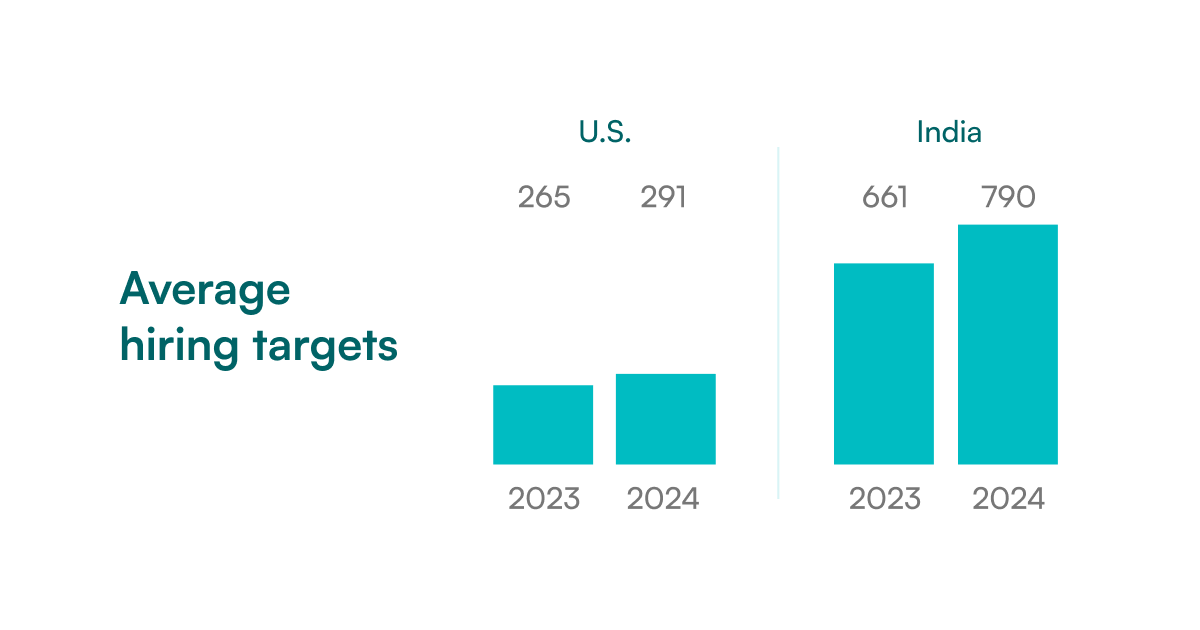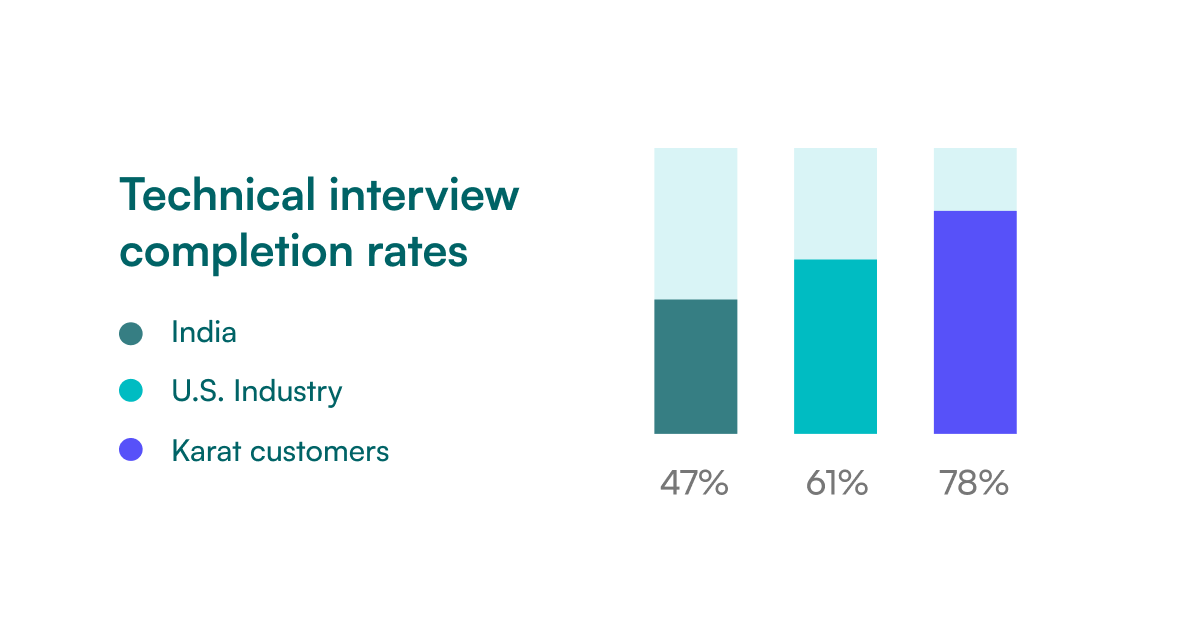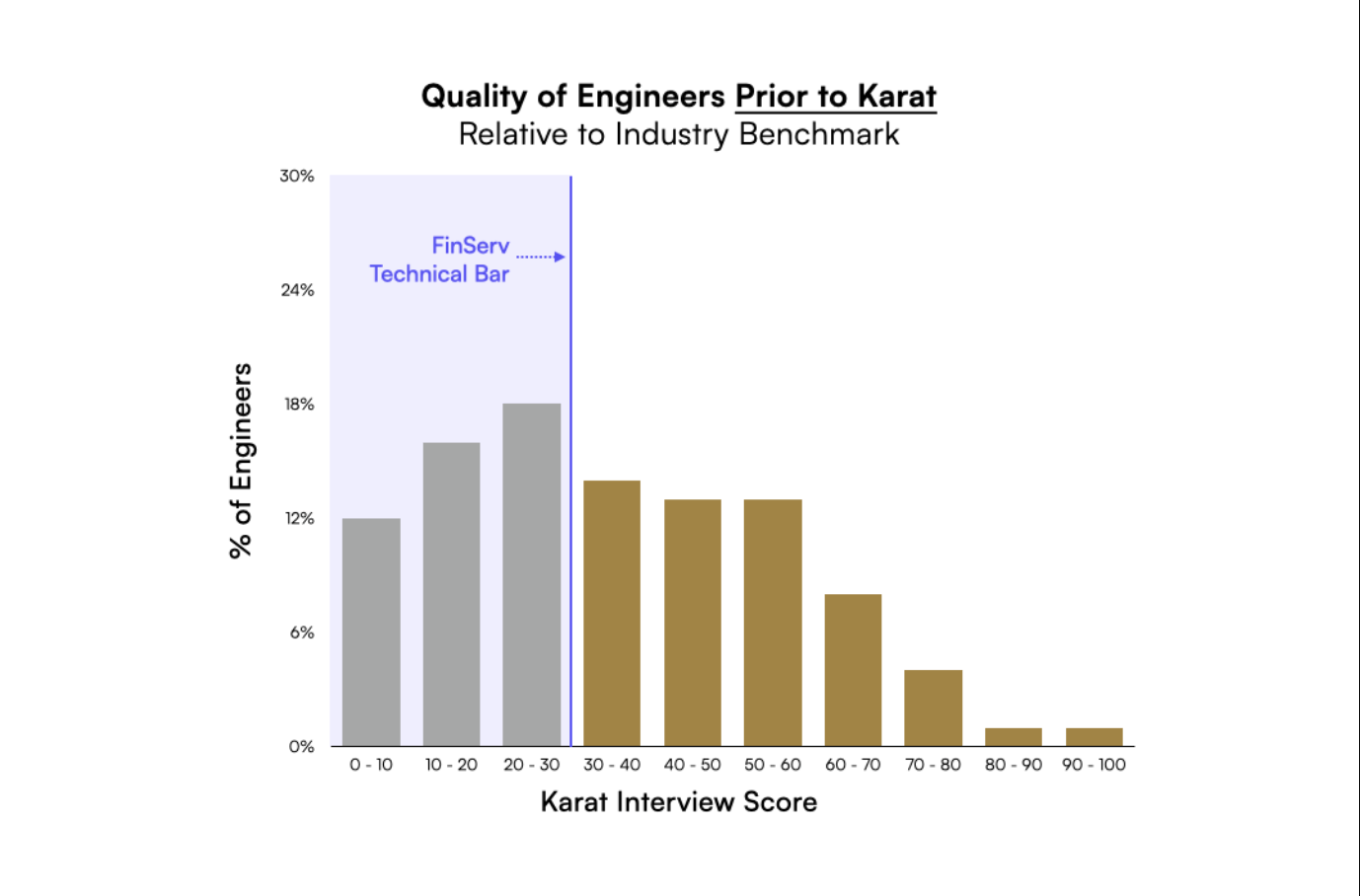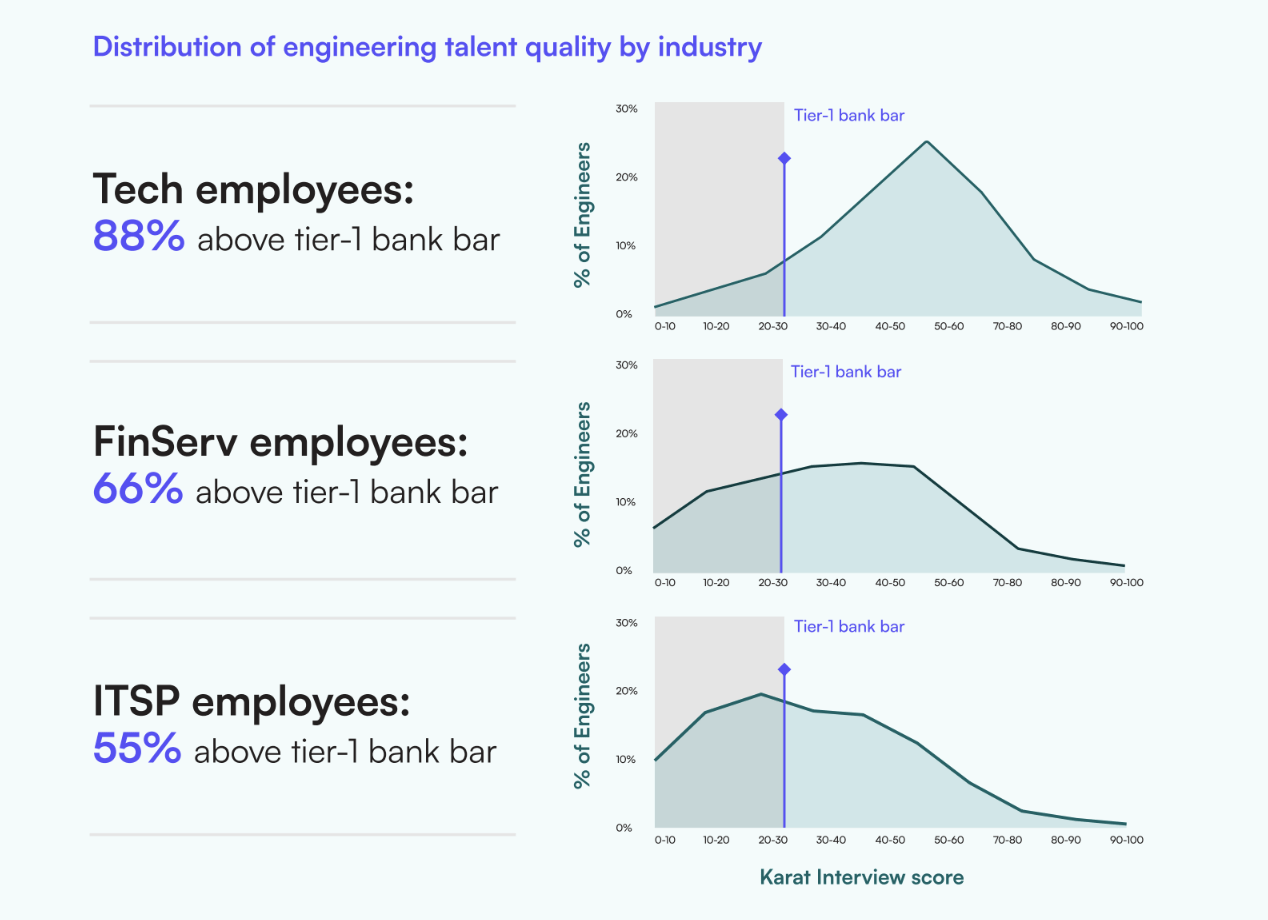Global Hiring
11.04.2024
How Tech Hiring Is Changing for 2025

The Karat Team


Tech hiring over the last two years has been plagued with mass layoffs and uncertainty. It looks like things are turning around though, as sentiment around technical hiring is rebounding in 2024.
Karat’s Tech Hiring Trends report surveys software engineering leaders to uncover how hiring is changing each year and the practices of the most successful leaders. This year’s report finds that software engineering leaders are optimistic about hiring, but there are also several challenges that are making it difficult to find and hire the right candidates.
Hiring Targets and Confidence Are Up
The 2024 Tech Hiring Trends report finds that 63% of all U.S. engineering leaders were very satisfied with the job performance of their company’s software engineering hires compared to 53% in 2023. There’s a similar optimism among engineering leaders in India. Satisfaction with the job performance of software engineering hires also increased, with 72% of engineering leaders in India very satisfied compared to 63% in 2023.
This optimism has translated into higher hiring targets across the board. Almost a quarter of (23%) of companies targeted hiring more than 300 software engineers in the U.S., while only 13% did so in 2023. Companies in the U.S. have an average of nearly 300 open software engineer roles, which is up 12% year-over-year. Non-U.S. hiring is also up, as 81% of U.S. engineering leaders said they plan to hire abroad compared to 73% last year. India leaders reported an average hiring target of 790 open roles, which is up 19% year-over-year.

Although hiring targets have increased substantially, the majority of engineering leaders are confident in meeting them. Just over half (57%) of U.S. engineering leaders are very confident that their company will meet their U.S. software engineer hiring targets this year compared to 45% in 2023. Among U.S. engineering leaders who plan to hire software engineers outside of the U.S., 70% are very confident in meeting their hiring targets. This is a record high, as 51% were very confident in 2023 and 53% in 2022.
The overall optimistic outlook on hiring and the fact that new software engineer job postings are at a five-year low has created an employer-friendly market. While the pandemic fueled a hiring boom that prioritized volume of hires, companies are now shifting to focus on the quality of talent. This is reflected in our data, as the average technical interview score required to get an offer at major enterprise or tech companies rose 12% last year. There has also been an increase in bar-raiser type programs that are aimed at improving the quality and performance of engineering teams.
How U.S. Hiring Is Impacting the India Market
India has become a global leader in engineering talent, attracting companies who want access to its deep talent pool — not just its lower costs. There are a number of reasons for this shifting perception.
The country has a growing number of tech hubs that offer large and skilled talent pools, advanced infrastructure, and government incentives. In our 2024 ranking of the top cities to hire software engineers, there’s one Indian city (Hyderabad) in the top 10 and six Indian cities (Hyderabad, Bangalore, Delhi National Capital Region, Chennai, Pune, and Mumbai) overall. In addition to these mature tech hubs, there are also many up-and-coming hubs that are rapidly developing.
India has several prestigious engineering institutions that produce 1.5 million engineering graduates each year. Five of the country’s universities made our list of the 50 best schools to hire software engineers this year. India also has widespread Internet access that makes it easy for people to develop tech skills and work remotely, a growing number of global capability centers (GCCs), a large tech-savvy population, and a thriving startup ecosystem.
Due to India’s rise as a powerhouse of engineering talent, the hiring dynamics between the U.S. and India have changed within the last few years as competition for software engineers heats up across the world. In the past, hiring software engineers in India was mostly driven by enterprise companies. Now, hiring mostly consists of tech companies that are opening GCCs in order to take advantage of India’s large developer market.
The increased competition for global talent is making it more difficult for engineering leaders to close top talent in India. Only a third (32%) of Indian software leaders found it very easy to hire top software engineering candidates that raise their hiring bar, as opposed to 41% last year.
Accurately assessing candidates’ technical skills is a common pain point in India, with 27% of India engineering leaders saying it’s difficult to do so. This is up significantly from 19% last year. When technical assessments lack predictiveness, it can impact the confidence that hiring leaders have in their hiring decisions. Only 48% of India engineering leaders are very confident that qualified candidates are advancing past the resume review, 55% for the initial recruiter screen, 58% for the first-round technical interview, and/or 65% when it comes to receiving offers after the final round.
While candidate drop-off is a problem in both the U.S. and India, it’s much more significant in India. On average, U.S. engineering leaders report that 61% of candidates complete their technical interview after receiving an invitation. In India, only 47% of candidates complete their technical interview after being invited.

Following the practices of successful software engineering leaders can make it easier to overcome current challenges and find the best candidates — whether you’re hiring in the U.S., India, or elsewhere. Download our 2024 Tech Hiring Trends report to learn more about the current hiring landscape and see what the top-performing engineering leaders are doing to not only meet their hiring targets, but also hire skilled candidates.
Related Content

AI Hiring
12.09.2025
Financial services (FinServ) organizations are increasingly relying on contract engineers. They’re among the top five industries driving outsourcing demand, and the European Central Bank found that banks increased their budget for information and communication technology services by an average of 2.1% from 2023 to 2024. Outsourcing provides access to specialized talent, as our data shows […]

Global Hiring
11.26.2025
The growth of global capability centers (GCCs) in India has exploded over the past few years. Hiring targets for 2024 were more than double that of the U.S., with an average of 790 open roles in India. This represents a 19% year-over-year increase. Real estate is also becoming impossible to find in GCC hubs such […]

AI Hiring
11.21.2025
AI is transforming the financial services (FinServ) industry, from trading to digital banking and fraud detection. As demand for digital innovation increases, FinServ organizations are increasingly relying on contractors and IT Service Providers (ITSPs) to deliver rapid progress while minimizing risk. Their expectations are rising at the same time, as engineering teams need to meet […]